Assata Zerai
Professor

Education:
PhD, Sociology, University of Chicago (1993)
Research Interests:
Decolonial Feminist Methodologies, Educational Equity, Sociology of Health, Inequality, Race and Ethnicity, Global/ Transnational Sociology, Black Feminist Thought, Gender, Gender Equity and Development Effectiveness, Maternal and Child Health, Sociology of ReligionProfile:
Dr. Assata Zerai serves as the Vice President and Professor of Sociology at the University of New Mexico (UNM). As VP, Zerai’s dynamic experiences and strong record of leading, planning for, resourcing, and documenting institutional climate and excellence have expanded UNM’s programming and strategy. As Principal Investigator (PI) on the UNM University-wide Campus Climate Surveys (Fall 2022 and Spring 2023) and other data collection efforts, Zerai and her team have published results and led dozens of workshops to provide guidance and support to UNM and partners. Other surveys Zerai has led include the LGBTQ Resource Center Faculty and Staff Needs Assessment (Spring 2022) and she was co-PI for the Survey for Faculty with Disabilities (Fall 2022). Zerai additionally serves as UNM’s liaison to the Alliance of Hispanic Serving Research Universities (HSRU), a collaboration of 27 HSRUs working to enhancing pathways and success of doctoral students and faculty within its institutions.
A decolonial feminist scholar, Zerai was coinvestigator on a grant from the Andrew W. Mellon Foundation, “Neoliberalism, Gender and Curriculum Transformation in Higher Education” in which she is collaborating with colleagues at the University of Illinois, University of KwaZulu-Natal, Durban Institute of Technology, and Stellenbosch University (2019-25). Zerai’s research deploys decolonial and Black feminist research methodologies to analyze achieving inclusion in complex organizations, just access to information and communications technologies, novel contributions of BIPOC women’s scholarship globally, and structural impediments to maternal and child health. She has published six books and numerous articles spanning these topics. Her latest book is Black Feminist Interventions to Decolonize the Westernized University(Rowman and Littlefield, 2025). Zerai is currently co-editing, a monograph, Disrupting Coloniality, Neoliberalism and Patriarchy in Higher Education: Using Feminist Decoloniality as Care (under contract with Palgrave Macmillan). And she is lead co-editor for Restorative Justice Practices Within Higher Education and the Arts: Addressing Complex Legacies of Harm, Social Sciences, MDPI.
Previously, Dr. Zerai was professor of sociology at the University of Illinois at Urbana-Champaign (2002-2019); and is currently Professor Emerita. Zerai’s work from 2014-2019 in various roles as Associate Chancellor, Associate Provost, and Associate Dean included multiple initiatives to diversify and enhance inclusivity of faculty, students, and staff from underrepresented groups. For example, Zerai was co-PI on a $1,000,000 award from the Alfred P. Sloan Foundation to increase proportions of and support to graduate students underrepresented in STEM. Zerai received the Zenobia Lawrence Hikes Women of Color in the Academy, National Award for Outstanding Administrative/Professional Faculty (March 2018).
A 2023 Fulbright-Hays Faculty Research Abroad scholar, Dr. Zerai holds the title of Visiting Professor, School of Human and Community Development, Speech Therapy Department of Speech Pathology and Audiology at the University of the Witwatersrand (Wits), Johannesburg, South Africa (2020-2026). There, she provides lectures, and continues to serve on dissertation committees, coauthor publications with Wits faculty members in the School of Human and Community Development—largely which focus on decolonial feminist methodology and pedagogy. During her Fulbright-Hays year, Zerai administered the Gender and Intersectional Microaggressions (GIMA) Survey and lead Confronting GIMAs Upstander workshops at Wits.
Books:
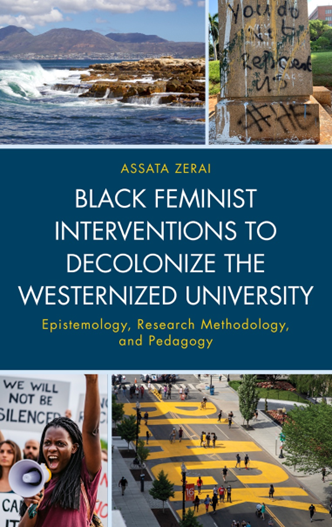
Black Feminist Interventions to Decolonize the Westernized University: Epistemology, Citational Justice, Research Methodology, and Pedagogy
Decoloniality is a perspective that challenges the colonial foundation and neoliberal operations of the westernized university today. In Black Feminist Interventions to Decolonize the Westernized University: Epistemology, Research Methodology, and Pedagogy Professor Assata Zerai highlights feminist decoloniality as a tool to promote institutional transformation, indirectly through changes in research and teaching in the social sciences, directly by centering social justice within higher education. Reflecting on three decades of scholarship, Zerai adapts principles of decolonial theory to scholarship, pedagogy, and praxis transnationally, focusing on higher education in the USA and South Africa. She intentionally centers students who have been racially and culturally excluded in these contexts and provides evidence of university students experiencing intersectional microaggressions, including gendered, ableist, and queerphobic anti-Blackness. Zerai argues that faculty must appreciate such realities in order to affirm students and create learning environments in which all may thrive. Further, this book argues that ethical commitments to minoritized students and their communities must be reflected in humanizing research practices. Finally, Zerai reviews ways in which scholars have begun to move their disciplines from a focus on traditional canons of the modernist era to embrace decolonial sensibilities in their academic work. This book highlights these new approaches within the social sciences, to promote justice, equity, accessibility, diversity, and inclusion (JEADI) within higher education. Available for purchase here.
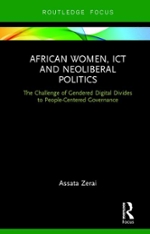
African Women, ICT and Neoliberal Politics: The Challenge of Gendered Digital Divides to People-Centered Governance
How can we promote people-centered governance in Africa? Cell phones/ information and communications technology (ICT) are shown to be linked to neoliberal understandings of more democratic governance structures, defined by the Worldwide Governance Indicators as: the rule of law, corruption-control, regulation quality, government effectiveness, political stability/no violence, and voice and accountability. However, these indicators fall short: they do note emphasize gender equity or pro-poor policies.
Writing from an African feminist scholar-activist perspective, Assata Zerai emphasizes the voices of women in two ways: (1) she examines how women's access to ICT makes a difference to the success of people-centered governance structures; and (2) she demonstrates how African women's scholarship, too often marginalized, must be used to expand and redefine the goals and indicators of democratice governance in African countries.
Challenging the status quo that praises the contributions of cell phones to the diffusion of knowledge and resultant better governance in Africa, this book is an important read for scholars of politics and technology, gender and politics, and African Studies.
Available for purchase here.
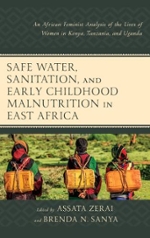
Safe Water, Sanitation and Early Childhood Malnutrition in East Africa: An Africana Feminist Analysis of the lives of Women and Children in Kenya, Tanzania and Uganda
To understand safe water and sanitation in East Africa, it is important to consider the contributions of African feminist analysis. This perspective will unveil inequities in the distribution of resources, demonstrate how localized solutions which are driven by women’s collaborative work have had an impact by temporarily easing the burden, and paint a multilayered picture of the lives of women and girls who are the predominant providers of water to households. This book explores the effects of water and sanitation quality and availability on early childhood morbidity in East Africa from an African feminist sociological perspective. It presents a framework that considers the ways that the development industry, neoliberalism, neocolonial relations, gender, class, ethnicity, globalization, and other dimensions of oppression intersect to impact upon the experiences and agency of women and children accessing clean water and safe sanitation and reducing early childhood morbidity in Kenya, Tanzania and Uganda. This work offers a vital contribution to the social scientific literature by adapting the vibrant intellectual work of African feminists to a quantitative methodology and enlarging the scope of empirically and theoretically grounded studies within the field of environmental sociology.
Available for purchase here.
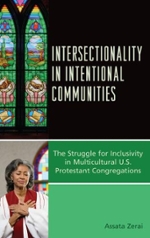
Intersectionality in Intentional Communities: The Struggle for Inclusivity in Multicultural U.S. Protestant Congregations
Over a decade of qualitative research, Assata Zerai has observed both incremental moves toward inclusiveness and strategies employed to accomplish long-term changes while conducting case studies of five multicultural Protestant churches in sites across the United States. With an interpretive approach, she explores these centers of worship and theorizes the conditions under which progressive social change occurs in some U.S. Protestant congregations. Understanding the daily practices of change and entrenchment in Protestant congregations and the intentional work to replace dominating structures with liberating ones may provide keys to creating multicultural, antiracist, feminist, and sexually inclusive volitional communities more broadly. Intersectionality in Intentional Communities argues that making a significant advance toward inclusion requires change in the underlying social structures of racism, sexism, heteronormativity, class, and other marginalizing influences. In order to isolate this phenomenon, Zerai conducted fieldwork and archival research among an African American and four multiracial U.S. churches. Different from a university or other public institution in which members are legally required to support diversity and related values, Zerai believes that volitional communities may provide a best-case scenario for how, motivated by higher ideals, members may find ways to create inclusive communities. Zerai’s research has a broad empirical base, encompassing five sites: a largely African American urban megachurch in the Midwest; a large Midwestern multiracial/multicultural church; a large urban multiracial/multicultural church in the eastern United States; a small, suburban Midwestern multiracial church; and an inclusive Midwestern college town church. In this book, Zerai further explores important connections between U.S. Protestant Christian congregations and political activism.
Available for purchase here.
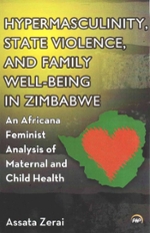
Hypermasculinity and State Violence in Zimbabwe: An Africana Feminist Analysis of Maternal and Child Health
In Hypermasculinity and State Violence in Zimbabwe Undermining Family Well-Being: An Africana Feminist Analysis of Maternal and Child Health, Assata Zerai explores the demography of maternal and child health in Southern Africa from an Africana feminist sociological perspective. She presents a framework that considers the ways that nation, race, class, gender, sexuality, globalization, and other dimensions of oppression intersect to impact upon the experiences and agency of individuals and groups with health care and social support in Zimbabwe. She analyzes data sets from demographic and health surveys for the country. On the basis of the Africana feminist framework, Zerai argues that maternal and child health cannot be understood unless the socioeconomic, political, and cultural contexts are taken into account. She extends and tests the hypothesis that militarism (especially state violence) and hypermasculinity in Zimbabwe have deleterious effects on family well-being in general, and especially on maternal and child health.
Available for purchase here.
Recent/Select Publications:
Zerai, Assata. (2023).Black Women Academics in the U.S.A. and South Africa Deploying Principles of Feminist Decoloniality as Care (FEMDAC) to Confront Experiences with Microaggressions.Agenda: Empowering women for gender equity. 37(2): 57- 73. August 2023. DOI 10.1080/10130950.2023.2225950. https://www.tandfonline.com/doi/full/10.1080/10130950.2023.2225950
Zerai, Assata (2023). “Teaching decolonial research methodology from a student-centered radical Black feminist orientation” in Roshini Pillay and Sharon Moonsamy (editors) Transforming Teaching and Learning Experiences for Helping Professions in Higher Education. Leiden, The Netherlands: Brill. https://brill.com/display/title/64461?language=enhttps://doi.org/10.1163/9789004540811
Zerai, Assata and Nancy López (2023). “Transforming Faculty Mentoring: A New Vision for Diversity, Equity and Inclusion in Academic Mentoring Programs” Chapter 12 in (Dave Law and Nora Dominguez, editors) Making Connections: A Handbook for Effective Formal Mentoring Programs in Academia. Utah State University Press. https://doi.org/10.26079/ff55-d7a0
Byrne, D.M.; Hamilton, K.; Houser, S.A.; Mubasira, M.; Katende, D.; Lohman, H.A.C.; Trimmer, J.T.; Banadda, N.; Zerai, A.; Guest, J.S. (2021). Navigating data uncertainty and modeling assumptions in quantitative microbial risk assessment (QMRA) to support decision-making in an informal settlement. 2022. Environmental Science & Technology. Apr 20;55(8):5463-5474. doi: 10.1021/acs.est.0c05693. Epub 2021 Mar 22. PMID: 33750111.
